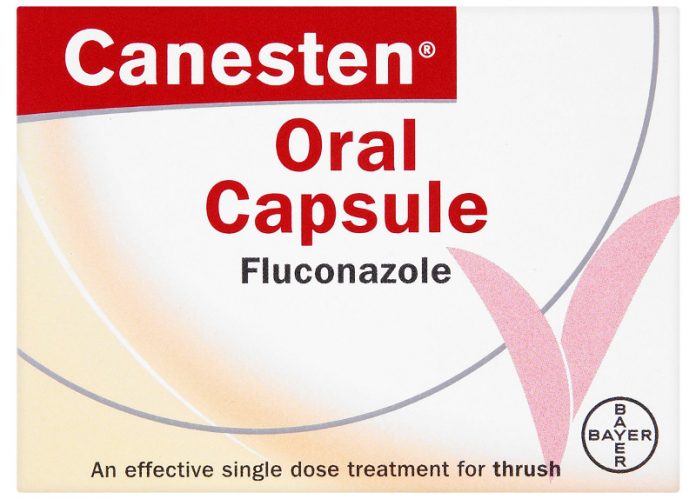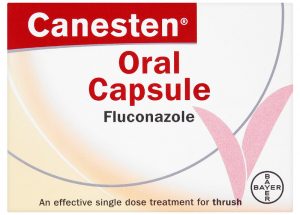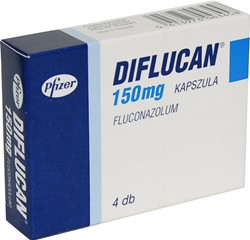
Oral thrush is a fungal infection of the mouth caused by a common organism – candida albicans. While this type of candida is normally present in small quantities in your mouth and gut, it only becomes annoying once it grows out of proportions – a process called candida overgrowth.
You won’t normally get thrush unless you’re suffering from a disease such as AIDS, cancer or diabetes, since this condition is pretty rare in healthy adults. Any serious imbalance in your mouth flora, such as poor hygiene and smoking, may also cause oral thrush.
If you do get it, it’s best to treat it as soon as soon as you notice the first symptoms.
However, not all anti-fungal medication will do the trick. Canesten won’t.
What is Canesten?
Canesten is an anti-fungal treatment for vaginal and penile thrush. It comes in a variety of forms, from vaginal tablets, to creams and pills.
The active ingredient in Canesten products is fluconazole, which is a powerful anti-fungal. However, other fluconazole-based drugs are used to treat oral thrush, such as Diflucan.
How do I use Canesten?
 In short, you don’t use it for oral thrush. However, since yeast infections can sometimes be systemic, you may want to use Canesten to treat vaginal or penile thrush. Remember that you’ll also want to ask your partner to get treated at the same time, as it’s possible they’re either infected, or carrying the fungus.
In short, you don’t use it for oral thrush. However, since yeast infections can sometimes be systemic, you may want to use Canesten to treat vaginal or penile thrush. Remember that you’ll also want to ask your partner to get treated at the same time, as it’s possible they’re either infected, or carrying the fungus.
If you’re using pills, you’ll have to take one per day, until the symptoms disappear. Vaginal tablets will also be inserted once a day, while creams will be applied locally.
Again, remember that you’re not supposed to take Canesten for oral thrush.
What does work for oral thrush?
 Probably the most common treatment is to apply an anti-fungal gel (such as miconazole) or anti-fungal drops (nystatin). Regardless of which one you choose, you’ll have to apply it four times a day over the infected regions. The typical length of such treatments is five to seven days.
Probably the most common treatment is to apply an anti-fungal gel (such as miconazole) or anti-fungal drops (nystatin). Regardless of which one you choose, you’ll have to apply it four times a day over the infected regions. The typical length of such treatments is five to seven days.
Another way to treat oral thrush is taking pills. Most doctors will generally recommend this type of treatment if the condition persists after the use of nystatin or miconazole. Fluconazole pills that will treat oral thrush are Diflucan or the generic Fluconazole. You’ll usually have to take them for a week, but some severe cases may ask for longer cures of up to two weeks.
Active compounds in natural ingredients have also been shown to cure oral thrush by directly affecting the candida albicans colonies in your mouth. Most of these solutions are applied locally, directly on the infected region. There’s no clearly determined period of treatment, as the strength of the solution plays an important role in killing candida. If your home remedy of choice seems to be ineffective after a few days of use, you may want to consult a doctor.
Some essential oils have been shown to kill candida albicans and lower the spread of thrush. The most commonly-used is coconut oil. You’ll have to apply extra-virgin coconut oil on the affected areas with a cotton swab, usually 2-4 times a day, until you’re happy with the results.
Another great home remedy is salt. Add one tablespoon of salt to one cup of water and use the mixture to gargle thoroughly. Repeat a few times a day for several days, until the symptoms are gone.
Conclusion
While fluconazole is a common anti-yeast compound, Canesten is not suitable for oral thrush. You can try plenty of other thrush medications that will help with your infection, and you can even try home remedies. Whatever you do, consult your doctor and stick to his/her recommendations.
Resources
http://www.nhs.uk/conditions/Oral-thrush—adults/Pages/Introduction.aspx
http://www.netdoctor.co.uk/medicines/infections/a8441/canesten-oral-capsule-fluconazole/
http://www.top10homeremedies.com/home-remedies/home-remedies-for-oral-thrush.html/
https://www.canesten.ca/en/canesoral-from-the-makers-of-canesten.php
http://www.emedicinehealth.com/oral_thrush/page4_em.htm#how_is_oral_thrush_treated

